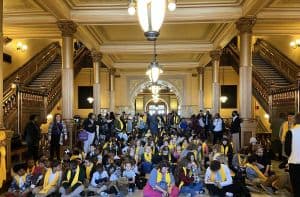A Parents Bill of Rights guaranteeing transparency and to be informed and involved in their children’s K-12 education was the subject of vigorous debate before the House K-12 Budget Committee, with education officials in opposition.
The bill descriptor for HB 2662 says it is “affirming certain parental rights relating to the education and upbringing of a child; requiring school districts to adopt policies to promote transparency and parental involvement in a child’s education; requiring each school district to establish an academic transparency portal on the school district’s website to provide information on learning materials and activities in each school; eliminating the affirmative defense for schools to the crime of promotion to minors of material that is harmful to minors; prohibiting teachers from being negatively evaluated for refusal to teach through critical pedagogy and philosophies or against sincerely held religious beliefs.”
Former Kansas House Speaker Mike O’Neal spoke in support of the bill on behalf of The Sentinel’s owner, Kansas Policy Institute, noting its fundamental issue is “parents are the primary deciders of what’s best for their children. And they look upon the public schools and trust the public schools are going to do the right thing. But as President Reagan once famously said, ‘Trust but Verify’. And I think we’re at that stage that there’s enough concern, whether it’s anecdotal, whether it’s real or imagined, there’s enough to verify the need to have parents know what is really going on. So that they can make informed decisions or have input or express concerns or have dialogue with the teachers.”
Brittany Jones, Director of Policy and engagement from Kansas Family Voice, testified the bill is needed by parents to stay informed: “Because most kids don’t come home and know to tell their parents what they learned in school that day, they often don’t know how to express what they did learn, whether that is something good that they learned or something that the parent might disagree with. And so this bill simply arms parents with those tools and that knowledge in order to actually engage well with their teachers and their school board, and other institutions that are involved in their children’s education.”
Matt Feinberg, Director of Education Policy at the Goldwater Institute, pointed out new teachers will benefit from this legislation by simplifying their lesson plans: “veteran teachers right now, who have refined their syllabi over the years, currently do not start from scratch each year, they tend to keep track of what materials they’ve used so that they can use those in the following year. For new teachers, this transparency bill would actually help them to do so by helping them see what other teachers are doing so that they can model their instruction off of the best and most successful instructors around the state.”
Several opponents cautioned the bill would allow political and religious objections to curriculum to act as censorship.
Thomas Witt of Equality Kansas feared repercussions for teachers using District-approved materials in an English class: “Pretend you’re a substitute teacher. You show up for Honors English class and there’s a box of books; “Catcher in the Rye” and instructions to hand out those books to your students and assign Chapter One. It’s 3:20 and as you’re on your way out of the building, you get hooked up by local PD because you have just given obscene materials to a minor?”
Mitch Rucker of Kansas Action for Children testified rural students’ learning opportunities could be diminished by the law: “We already know that there are disparities in the course offerings and the material that is accessible to students based off of (sic) where they live. With more affluent and more densely populated districts, providing more options to their students, I see this bill potentially further limiting the access that our students in rural districts have to literature and other educational materials based off of (sic) the cultural or ideological makeup of the community in which they live.”
Kimberly Streit-Vogelsberg of the Kansas chapter of the National Education Association said the bill is unnecessary: “The bill is an attempt to solve a problem which does not exist. We support transparency and parental involvement. But existing processes protect these while also allowing teachers to teach. This bill upsets that, conflicts with FERPA (Family Education Rights and Privacy Act), and results in increased confusion, increased costs, litigation and also watered down education.”
Parents believe there is a problem, however, including a lack of transparency. Just last week, a history teacher in the Blue Valley school district gave a homework assignment asking students to explain “the rise in right-wing domestic terrorism.” Parents had no advanced knowledge that students would be given a political opinion as a statement of fact.
A public opinion poll commissioned by Kansas Policy Institute also points to parental concern. Parents believe they should have the primary say over how their children are educated, with 88% strongly or somewhat agreeing and only 11% expressing some measure of disagreement.
The majority — 57% — are concerned that their children and grandchildren may be exposed to objectionable subject material, and 75% believe taxpayer-funded accounts should be available to parents if their school district isn’t meeting the academic needs of their children.
The Committee approved the bill and sent it to the full House for consideration.




